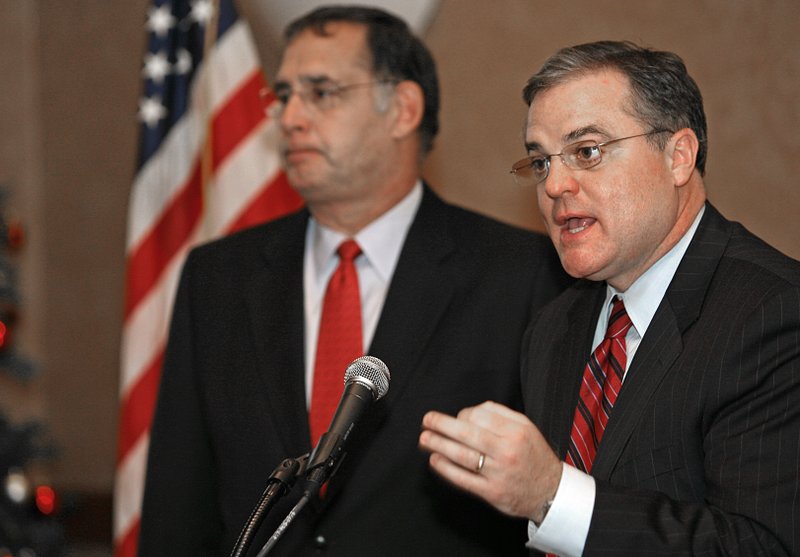WASHINGTON — As their first order of business when senators return to Washington on Jan. 25, Senate Democrats will attempt to weaken the minority party’s ability to block legislation.
Led by New Mexico’s Sen. Tom Udall, they argue the Senate is broken, a result, Udall told his colleagues earlier this month, of “partisan rancor and the Senate’s own incapacitating rules.”
They would like to weaken the ability to filibuster, a Senate tactic that allows the minority party to stall a bill unless a 60-vote threshold is cleared, and to prohibit the practice of placing secret “holds” on legislation.
Both of Arkansas’ senators, Democrat Mark Pryor and Republican John Boozman, oppose weakening filibuster provisions.
To break a filibuster, 60 Senators must vote for “cloture” - that is, to stop debate and hold a final vote - rather than the simple majority required for most legislation. So-called Rule XXII, which introduced cloture, was first agreed to by the Senate in 1917. Back then, it took a two-thirds vote of the Senate to end debate.
Democrats argue that Republicans abused the filibuster last Congress. During the past two years, Republicans forced cloture votes on 91 bills, up from 58 during the 106th Congress 10 years ago.
Republicans argue they had no choice: Democrats blocked Republican amendments from being considered, they say, relegating them to junior partners in the chamber.
Republicans and some Democrats say protecting the rights of the minority party in the Senate protects against a majority acting too quickly on contentious legislation.
Ordinarily, it takes a two thirds vote to change Senate rules. But when the Senate convenes at the start of a new Congress, changes can be passed by a simple majority.
Although the current Congress began when the Senate went into session Jan. 5, members did not take a vote on new rules. Using that lower threshold, Udall and other Democrats will call for a vote.
Udall’s rules package would end secret holds, limit the time for debate allowed before and after a cloture vote is held and, perhaps most importantly, require that a Senator engaging in a filibuster actually continue speaking nonstop on the floor of the Senate.
In 2005, Arkansas’ Sen. Mark Pryor was a group of senators known as the “Gang of 14,” which successfully negotiated a truce on judicial nominations. Then-Senate Majority Leader Bill Frist, R-Tenn., had threatened to use the rule-changing technique similar to the one now being promoted by Udall to push President George W. Bush’s nominees through the chamber.
Now a member of the Senate Rules Committee, Pryor has advised against changing the rules.
“We must protect the minority’s right to debate and amend legislation here in the Senate,” Pryor said.
He noted that the balance in the chamber, which is tilted 53-47 to the Democrats, could lean the other way in the future.
“We should not make these decisions based on what party is in power at the moment,” he said.
Changing the rules on filibusters “would be a big mistake,” agreed Arkansas’ Sen.John Boozman, a Republican Senate freshman.
Both Pryor and Boozman said they were undecided on another part of Udall’s proposal, getting rid of “secret” holds.
“That’s something I need to become more familiar with,” Boozman said.
Pryor said that before the use of secret holds, senators made their objections to a nominee or bill known, allowing members to work things out.
While senators should have the prerogative to block things, doing so anonymously makes negotiations difficult, Pryor said.
Sen. Lamar Alexander of Tennessee, the chairman of the Republican Senate Conference, criticized the “brazenness” of the Democratic effort to change the rules.
“It is essential to our country that cooler heads prevail,” he said.
Sen. Mark Udall, D-Colo., has proposed that the rules for cloture be changed to a three-fifths vote of those actually present on the Senate floor.
In an e-mail to supporters, Udall said his proposal makes sense, regardless of who is in power.
“Don’t get me wrong: I have a deep respect for the Senate, and I also realize that the winds of political fortune change,” he wrote. “But the simple fact is that, in recent years, the filibuster has been used to bring the people’s business to a halt in order to score political points - and I can’t stand by and let that happen.”
Boozman noted that Senate Majority Leader Harry Reid, D-Nev., used legislative maneuvers to limit Republicans’ ability to add amendments during debate on last year’s health-care legislation. The only way to shape the proposal, he said, was to bring the Senate to a halt.
“They’re leaving us no other alternative but to filibuster,” Boozman said.
Front Section, Pages 1 on 01/17/2011

